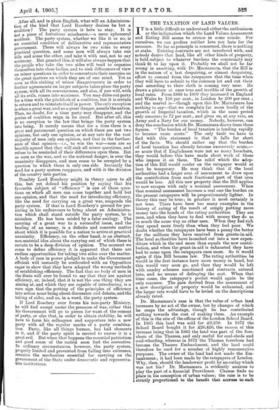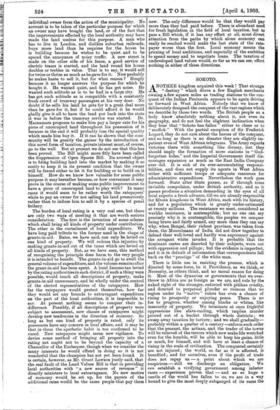THE TAXATION OF LAND VALUES.
IT is a little difficult to understand either the enthusiasm or the indignation which the Land Values Assessment and Rating Bill seems to arouse in some minds. For ourselves, we can profess neither love nor hate for the measure. So far as principle is concerned, there is nothing at stake. Existing contracts are not interfered with, and nobody denies that land, like all other kinds of property, is held subject to whatever burdens the community may think fit to lay upon it. Probably we shall not be far wrong in asserting, with Dr. Macnamara, that the Bill is in the nature of a last despairing, or almost despairing, effort to conceal from the ratepayers that the time when they will have to submit to the common lot and cut their coat according to their cloth is coming very near. He draws a picture at once true and terrible of the growth of local rates. From 1868 to 1899 they increased in England and Wales by 150 per cent., in London by 200 per cent. ; and the marvel is—though upon this Dr. Macnamara has nothing to say—that we complain far more loudly of the growth of Imperial taxation, which in the same period only amounts to 72 per cent., and gives us, at any rate, an Army and a Navy for our money. Nobody, however, can deny the conclusion which Dr. Macnamara draws from these figures. "The burden of local taxation is tending rapidly to become more acute." The only fault we have to find with this statement is that it falls far short of the facts. We should rather say that the burden of local taxation has already become excessively acute,— so acute that if Englishmen were not so many Issachars, they would before this have made short work of those who impose it on them. The relief which the adop- tion of this Bill would confer on the ratepayer would at best be temporary. He may think that if the local authorities had a larger area of assessment to draw upon the contribution from each fractional part of that area would be less. All this new property that the Bill applies to now escapes with only a nominal assessment. When that nominal assessment becomes a real one the burden on the present ratepayers will be proportionately lighter. In theory this may be true; in practice it most certainly is not true. There have been too many examples in the history of rating of the result of simply putting more money into the hands of the rating authorities. They are men, and when they have to deal with money they do so in much the same way as other men. When they feel rich they spend more freely than when they feel poor. We doubt whether the ratepayers have been a penny the better for the millions they have received from grants-in-aid. The local ai.thorities have launched out into a new expen- diture which in the end more than equals the new contri- bution, and when the grant-in-aid is exhausted they have had to come upon the ratepayers once more. So it would again if this Bill became law. The rating authorities be would in the first instance have more money in hand, but this would very soon go, and then they would be left with sundry schemes sanctioned and contracts entered into, and no means of defraying the cost. When that time came, the ratepayer's pocket would again be the only resource. The gain derived from the assessment of a new description of property would be exhausted, and the larger rate would have to be levied on the descriptions already rated.
Dr. Macnamara's case is that the value of urban land increases by no act of the owner, but by changes of which he reaps the advantage, though he has contributed nothing towards the cost of making them. An example of this is the site of the offices of the London School Board. In 1865 this land was sold for £8,250. In 1872 the School Board bought it for £26,420, the reason of this increase being that in 1865 the land was part of the fore- shore of the Thames, and only useful for coal-sheds and coal-whaxfing, whereas in 1872 the Thames foreshore had become the Thames Embankment, and the land could therefore be used for a number of highly remunerative purposes. The owner of the land had not made the Em- bankment; it had been made by the ratepayers of London. Why, then, should the landowner profit by an outlay which was not his ? Dr. Macnamara is evidently anxious to play the part of a financial Providence. Chance finds no place in his conception of urban values • the rate is to be strictly proportioned to the benefit that accrues to each individual owner from the action of the municipality. No account is to be taken of the particular purpose for which an owner may have bought the land, or of the fact that the improvements effected by the local authority may have made the land useless for this purpose. A man who has to live in London, and dislikes suburban railroads, buys more land than he requires for the house he is building because he wishes to be quiet and to be spared the annoyance of noisy traffic. A new street is midi on the other side of his fence, a good service of electric trains is started, and the land round his house doubles or trebles in value. That is to say, it would sell for twice or thrice as much as he gave for it. Now probably he makes haste to sell it, but for what reason ? Simply because it no longer answers the purpose for which he bought it. He wanted cluiet, and he has got noise. He wanted such solitude as is to be had in a large city. He has got such solitude as is compatible with a constantly fresh crowd of tramway passengers at his very door. No doubt if he sells his land he gets for it a great deal more than he gave for it, but if he could afford it he would gladly give it all to have the land put back into the state it was in before the tramway service was started. Dr. Macnamara. proposes to make him v a larger rate for his piece of unoccupied land throughout his possession of it because in the end it will probably lose the special quality which made him buy it. If it can be shown that the com- munity will be greatly the gainer by the introduction of this' novel form of taxation, private interest must, of course, go to the wall. But at present we do not see that this has been proved. The Bill might more fitly have been called the Suppression of Open Spaces Bill. Its avowed object is to bring building land into the market by making it so costly to keep it in its present condition that the owner will be forma either to let it for building or to build on it himself. How do we know how valuable for some public purpose it may hereafter become, or how convenient it may prove in the course of making some public improvement to have a piece of unoccupied land to play with? In many cases it would seem to be rather worth the ratepayers' while to pay an owner for not selling his land prematurely rather than to induce him to sell it by a species of penal bribery.
The burden of local rating is a very real one, but there are only two ways of meeting it that are worth serious consideration. The first is the invention of some scheme which shall bring all kinds of property under contribution. The other is the curtailment of local expenditure. We have long paid tribute to the former need in the shape of grants-in-aid. Rates, we have said, can only be levied on one kind of property. We will redress this injustice by making grants-in-aid out of the taxes which are levied on all kinds of property. But, as we have seen, this method of recognising the principle does harm to the very people it is intended to benefit. The grants-in-aid go to swell the general volume of expenditure, and the volume remains after the grant-in-aid has been spent. A local Income-tax levied by the rating authorities in each district, if such a thing were possible, would touch all descriptions of property, make grants-in-aid unnecessary, and be wholly under the control of the elected representatives of the ratepayers. How far the ratepayers would protect themselves, how far they would set any bounds to extravagant expenditure on the part of the local authorities, it is impossible to say. At present nothing seems to conquer their in- difference. Possibly, if all descriptions of property were subject to assessment, new classes of ratepayers might develop new tendencies in the direction of economy. So long as but one kind of property is rated, only its possessors have any concern in local affairs, and it may be that in them the apathetic habit is too confirmed to be cured. New ratepayers might mean new vigilance. To devise some method of bringing all property into the rating net ought not to be beyond the capacity of a Chancellor of the Exchequer, though when we consider the many interests he would offend in doing so it is not wonderful that the champion has not yet been found. It is certain, however, as Mr. Grant Lawson justly said, that the real fault of the Land Values Bill is that in providing local authorities with "a new source of revenue" it directly ministers to local extravagance. No new motive of economy would be set up, for the payers of the additional rates wottld be the same people that pay them now. The only difference would be that they would pay more than they had paid before. There is abundant need for fresh legislation in the field of local taxation, but to pass a Bill which, if it has any effect at all, must divert attention from the paths by which alone economy can really be reached would make the last state of the rate. payer worse than the first. Local economy means the pruning of local ambitions, and. especially of the ambitioh to spend money and to negotiate loans. The taxation of undeveloped land values would, so far as we can see, effect nothing in either of these directions.











































 Previous page
Previous page